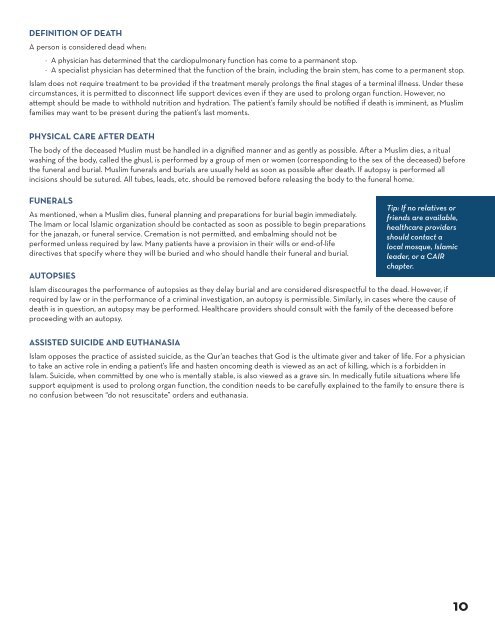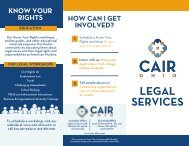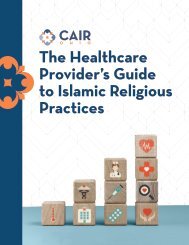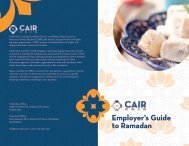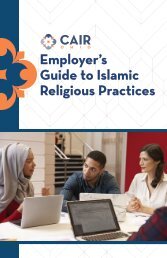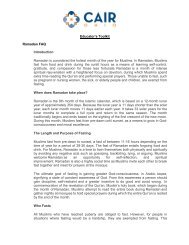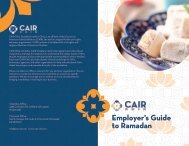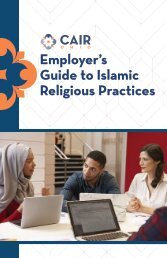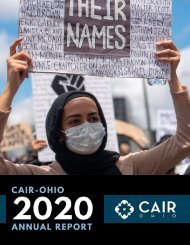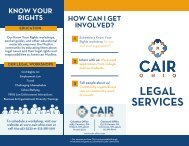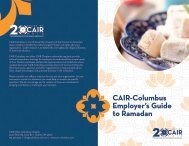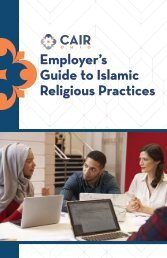CAIR-Ohio-Healthcare-Providers-Guide
Create successful ePaper yourself
Turn your PDF publications into a flip-book with our unique Google optimized e-Paper software.
DEFINITION OF DEATH<br />
A person is considered dead when:<br />
− A physician has determined that the cardiopulmonary function has come to a permanent stop.<br />
− A specialist physician has determined that the function of the brain, including the brain stem, has come to a permanent stop.<br />
Islam does not require treatment to be provided if the treatment merely prolongs the final stages of a terminal illness. Under these<br />
circumstances, it is permitted to disconnect life support devices even if they are used to prolong organ function. However, no<br />
attempt should be made to withhold nutrition and hydration. The patient’s family should be notified if death is imminent, as Muslim<br />
families may want to be present during the patient’s last moments.<br />
PHYSICAL CARE AFTER DEATH<br />
The body of the deceased Muslim must be handled in a dignified manner and as gently as possible. After a Muslim dies, a ritual<br />
washing of the body, called the ghusl, is performed by a group of men or women (corresponding to the sex of the deceased) before<br />
the funeral and burial. Muslim funerals and burials are usually held as soon as possible after death. If autopsy is performed all<br />
incisions should be sutured. All tubes, leads, etc. should be removed before releasing the body to the funeral home.<br />
FUNERALS<br />
As mentioned, when a Muslim dies, funeral planning and preparations for burial begin immediately.<br />
The Imam or local Islamic organization should be contacted as soon as possible to begin preparations<br />
for the janazah, or funeral service. Cremation is not permitted, and embalming should not be<br />
performed unless required by law. Many patients have a provision in their wills or end-of-life<br />
directives that specify where they will be buried and who should handle their funeral and burial.<br />
AUTOPSIES<br />
Tip: If no relatives or<br />
friends are available,<br />
healthcare providers<br />
should contact a<br />
local mosque, Islamic<br />
leader, or a <strong>CAIR</strong><br />
chapter.<br />
Islam discourages the performance of autopsies as they delay burial and are considered disrespectful to the dead. However, if<br />
required by law or in the performance of a criminal investigation, an autopsy is permissible. Similarly, in cases where the cause of<br />
death is in question, an autopsy may be performed. <strong>Healthcare</strong> providers should consult with the family of the deceased before<br />
proceeding with an autopsy.<br />
ASSISTED SUICIDE AND EUTHANASIA<br />
Islam opposes the practice of assisted suicide, as the Qur’an teaches that God is the ultimate giver and taker of life. For a physician<br />
to take an active role in ending a patient’s life and hasten oncoming death is viewed as an act of killing, which is a forbidden in<br />
Islam. Suicide, when committed by one who is mentally stable, is also viewed as a grave sin. In medically futile situations where life<br />
support equipment is used to prolong organ function, the condition needs to be carefully explained to the family to ensure there is<br />
no confusion between “do not resuscitate” orders and euthanasia.<br />
10


